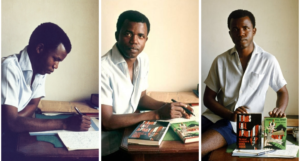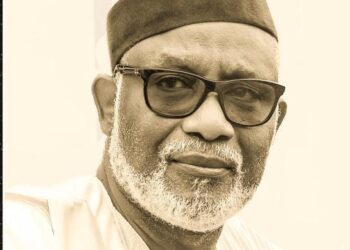It is about ten years since the death of Chinua Achebe, author of the world acclaimed novel, Things Fall Apart. He was born on 16th November, 1930 in Ogidi, Anambra State, and died on 21st March, 2013 in Boston, Massachusetts. Though known more for Things Fall Apart, which depicts the social and psychological confusion resulting from the imposition of Western values on African traditional society, he has other works to his name. They include No Longer at Ease, Arrow of God, A Man of the People, and Anthills of the Savannah. The central themes of the novels range from the clash of cultural values to attempts by the pioneer African elites to create order out of the changing and conflicting values.
His writings are indeed a monumental legacy that will never be forgotten. And so are his other literary endeavours such as creating opportunities for African writers to get published. He was for many years the Editor of Heinemann’s African Writers’ Series, which provided a global audience for many African writers. He is also responsible for the creation of literary platforms for writers to meet and cross-fertilise ideas, including the Association of Nigerian Authors (ANA). It is no surprise, therefore, that the association is set to mark the 10th anniversary of his death in a big way.
The two-day event is scheduled to take place from 19th to 21st May, 2023 at the Mamman Vatsa Writers’ Village, Abuja. Highlights of the activities lined up for the memorial include tributes and reminiscences on the legend, open conversation between the old and the young writers on the immortality of creativity, and the ten years after Achebe’s transition. The event will be rounded off with a grand dinner.

This initiative by the Camillus Chima Ukah-led administration is another milestone in the annals of ANA. The effort is commendable for several reasons. It is a great honour to a great man of letters globally regarded as the father of African Literature and a fitting tribute to the brain behind the formation of ANA, the biggest national writers’ body in Africa.
The creation of ANA was mooted by Achebe about 42 years ago, precisely on 27th June, 1981, in a conference of Nigerian writers he convened at the University of Nigeria, Nsukka. Soon after the convention, which was attended by notable writers from within and outside Nigeria, including Ngugi Wa Thiong’o and Gacheche Wauringi, the association was registered as a corporate body/professional association with the Corporate Affairs Commission. And since then it has, in line with its mission of building a vibrant and responsive body of creative writers based on the foundation of freedom of expression and high ethical standards, engaged in various programmes and activities designed to actualise the noble goal.
So far, one could say so much has been achieved. In terms of partnership towards worthy literary causes, ANA has collaborated and networked with fellow arts and culture organisations in the country and beyond. The national ANA has been partnering with state chapters to stage programmes and events like conventions, cultural festivals, readings, and poetry performances. On the international level ANA has worked closely with the Pan African Writers Association (PAWA) to promote literary creativities beyond the shores of Nigeria.
One of the notable attainments by the association through collaboration with individuals is the Annual ANA/Yusuf Ali Literary Awareness Campaign sponsored by Mallam Yusuf Olaolu Ali, a Senior Advocate of Nigeria based in Ilorin, Kwara State. Since the grant was instituted in 2012, state chapters of the association have at different times received generous funds for the annual campaign involving literary activities like quiz and writing competitions among secondary schools.
The allocation of a vast stretch of land in Abuja by the late Mamman Jiya Vatsa to ANA for the development of a multipurpose writers’ village could be considered the most significant contribution towards sustaining ANA. The unprecedented gesture was indeed a dream come true for ANA members. Without delay, ANA leadership began to find ways of not only securing the land but developing it into a befitting national headquarters. Tremendous progress has been made towards this end, and today the association is a proud owner of a massive edifice situated at the Mamman Vatsa Writers’ Village. The complex comprises a large conference hall christened Chinua Achebe International Conference Centre, the ANA national secretariat tagged Femi Osofisan Secretariat, the ANA Library and Research Centre and an ultra-modern hotel with each room named after prominent members of the association. The current Executive Council under the able leadership of Mr. Camillus Chima Ukah is exerting all efforts to ensure positive outcomes that would culminate in the completion of the entire project in good time.
The monthly Mbari Series is another recent accomplishment of ANA that reaffirms Achebe’s enduring legacy. The platform for literary discussion, originally tagged the Mbari Club, was founded in Ibadan 62 years ago by the German scholar, writer and editor, Ulli Beier, in collaboration with Wole Soyinka, Chinua Achebe, and others. As a centre for cultural activities for African writers, artists and musicians, membership included personalities like the South African writers Ezekiel Mphahlele and Arthur Nortje.
The revival of the forum by the present Executive Council is important not just in terms of providing a platform for airing writers’ views on current national issues from literary perspectives but as a symbolic gesture signifying the enduring vision of the founders of the Mbari Club.
Similarly, the commemoration of the 10th Anniversary of Achebe’s death, under the theme, “The Immortality of Creativity: Ten Years After Achebe’s Transition,” is a noble effort at recognising the monumental roles of the father of African literature and the founder of the Association of Nigerian Authors – an honour duly deserved. It is, therefore, an occasion for sober reflection on Achebe’s legacies and fruitful discussions on how to sustain and promote them for the development of African literature to which he dedicated his entire life.
* Umaisha writes from Abuja





